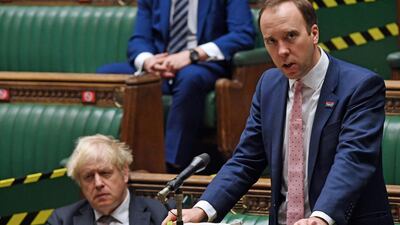In the words of that great song from the 1942 movie Casablanca, "you must remember this / a kiss is just a kiss". That may be true for Humphrey Bogart and Ingrid Bergman, but a kiss has become much more than just a kiss for one of Britain's most important government ministers, Matt Hancock. It is a scandal and the kiss of political death for Mr Hancock, while being hugely embarrassing for his boss, Prime Minister Boris Johnson.
As health secretary, Mr Hancock has been forced to quit as the key politician in charge of the fight against coronavirus. When a tabloid newspaper published pictures of him caught on camera in government offices kissing a woman who is not his wife, it's become much more than private embarrassment.
First, Mr Hancock clearly broke his own coronavirus rules on social distancing, confirming the suspicion that powerful government figures think rules are just for "the little people", not for them. Second, Mr Hancock employed the woman involved, Gina Coladangelo, on the government payroll under circumstances which have yet to be explained. Third, Mr Hancock faces numerous allegations he awarded lucrative contracts in the fight against coronavirus to friends or donors to the Conservative party. Fourth, there are potential security implications in the leaking of pictures from a government ministry. And fifth, other messages leaked from Mr Johnson's phone show that the prime minister previously described Mr Hancock as "totally useless".
This adds up to a profound loss of trust in key figures in government – and a loss of trust between these key figures, too. Even before this scandal, opinion polls showed that Mr Johnson was trusted by only 25 per cent of British people. Even more debilitating for the government is whether the prime minister himself can trust those around him. One formerly trusted key adviser, Dominic Cummings, was dismissed by Mr Johnson and has begun a slow drip feed of revenge, revealing internal communications that show Mr Johnson in a bad light. Mr Hancock may have discredited himself, but he, too, will have a vast trove of potentially embarrassing information about Mr Johnson's lazy handling of the coronavirus threat.
The already publicised scandals and dodgy dealings are too numerous to mention here, but Mr Johnson has an enormous strategic dilemma. When he sits around the Cabinet table with top ministers and advisers, who among them can he trust for honest advice? Who among them will trust him? Anyone in a position of leadership in politics, business or academic life, needs to build a trusted team.
Just last week, to take two personal examples, I had a very frank private discussion with the executive team of a large business who are trying to rebuild confidence among their staff after a series of failures. Then I had a private discussion with some university chancellors, and separately a private chat with a university vice chancellor. In each meeting we all spoke freely because we do trust each other. But what of Mr Johnson and his team of rivals, if distrust is the silent guest at the Cabinet table, phone messages are leaked and security camera pictures end up in tabloid newspapers?
A few years ago, I sat down with the philosopher Onora O’Neill to discuss how to build trust in our distrustful age. Baroness O’Neill had delivered the Reith Lectures on that subject and two of her observations struck me as being both absolutely correct and yet potentially contradictory. She said that to be trusted, a leader must demonstrate being trustworthy. Then she observed that “people often choose to rely on the very people whom they claimed not to trust".

The British people have done exactly that. We have chosen to rely upon Mr Johnson whom as a nation most of us do not find to be trustworthy. In his dealings, personal life and judgment Mr Johnson has relied upon numerous advisers of somewhat dubious ethics and competence, Mr Cummings and Mr Hancock among them. EU leaders have expressed significant reservations about Mr Johnson's own trustworthiness in signing and then trying to renegotiate last December's Brexit agreement.
To my own astonishment I have begun to feel a tiny shred of compassion for our failing and flailing prime minister because he reminds me of a tragic and ultimately paranoid character in a Franz Kafka short story titled The Burrow. The character is a cornered animal who digs a burrow for protection, but then realises that if attacked, there is no escape without a second tunnel. But what if two attackers come? The animal digs two, three, then more and more escape tunnels until it realises that every means of escape is also a means of attack. This is where lack of trust ultimately leads.
Imagine Mr Johnson, with all his colleagues round the Cabinet table, each man and woman wondering who among them the prime minister considers “totally useless". In business, they say if you do not know who is the most useless person in the room, then it’s probably you. Some in his own party and government may already believe it is Mr Johnson. He has dug his own burrow.
Gavin Esler is a broadcaster and UK columnist for The National


